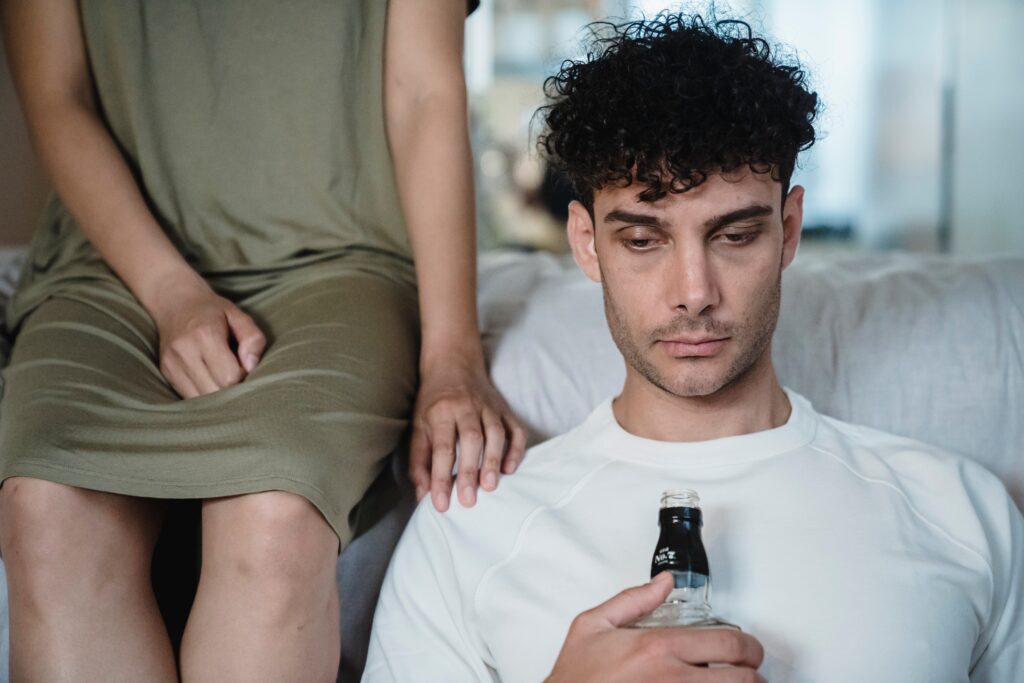Post-Traumatic Stress Disorder (PTSD) and substance use disorders often coexist. Understanding ‘what PTSD stands for’ and how it is correlates with addiction is critical.
PTSD is a mental health condition triggered by experiencing or witnessing a terrifying event, creating deep scars on an individual’s psychological framework. On the other hand, substance use disorders—encompassing drug and alcohol addiction—occur when an individual’s use of substances leads to health issues or problems at work, home, or school.
Understanding the connection between the two conditions is vital. It informs us about the overlapping symptoms, the common threads of pain and the attempts to numb it, and the importance of addressing both issues simultaneously in treatment.
This blog post will uncover the complex relationship between PTSD and substance use disorders, look at their prevalence and symptoms, and explore the various treatment options.
What PTSD Stands For
PTSD, or Post-Traumatic Stress Disorder, is a mental health condition that can develop after a person experiences or witnesses a traumatic event. Traumatic events may include natural disasters, accidents, physical or sexual assault, combat, or other life-threatening situations. You must take note that not everyone who goes through a traumatic event will develop PTSD.
The symptoms of PTSD can manifest in various ways and can impact an individual’s daily life. They are categorized into four main clusters: intrusion, avoidance, negative alterations in cognition and mood, and alterations in arousal and reactivity.
- Intrusion symptoms are characterized by distressing and intrusive memories, flashbacks, or nightmares related to the traumatic event.
- Avoidance symptoms involve avoiding reminders or triggers associated with the trauma, such as avoiding certain places, people, or activities.
- Negative alterations in cognition and mood may include feelings of guilt, shame, or emotional numbness, as well as difficulty maintaining close relationships or experiencing positive emotions.
- Alterations in arousal and reactivity can manifest as heightened anxiety, irritability, difficulty concentrating, sleep disturbances, and an exaggerated startle response.
The Connection Between PTSD and Alcohol Abuse
Many people with PTSD turn to alcohol to alleviate their distressing symptoms. They may hope that alcohol will temporarily relieve intrusive thoughts, nightmares, anxiety, and emotional pain. However, relying on alcohol as a means of coping can harm their mental and physical well-being.
Moreover, alcohol abuse poses additional risks for individuals with PTSD. Excessive alcohol consumption can disrupt sleep patterns, exacerbate mood swings, and interfere with the effectiveness of prescribed medications. It can also impair judgment and increase the likelihood of engaging in risky behaviors.
Integrated treatment approaches that address trauma-related symptoms and substance use disorder are essential for long-term recovery and overall well-being. By addressing the root causes of both conditions, individuals can regain control over their lives and work towards healing and resilience.

How are PTSD and Substance Use Disorders Related?
Individuals with PTSD commonly use substances to self-medicate. This self-medication is often an attempt to cope with their trauma. However, this can lead to a dangerous cycle where substance use worsens PTSD symptoms over time.
The military is one of the most affected sectors of society for this co-occurring disorder. The prevalence of PTSD and substance abuse in veterans is particularly high, with up to 20% of the population experiencing this.
The unique challenges they face increase their vulnerability to both conditions. The trauma endured during service can significantly contribute to the development of PTSD. At the same time, the stressful and demanding nature of military life can increase the risk of substance abuse as a coping mechanism.
What PSTD Stands For | Substance Abuse Treatment Options
Treating individuals with co-occurring PTSD and substance use disorders presents unique challenges. These conditions often interact and reinforce each other, making the treatment process more complex. It is vital to address both conditions simultaneously to achieve successful outcomes.
Integrated treatment that addresses both PTSD and substance use disorders is crucial. Treating one condition without addressing the other may lead to limited progress and potential relapses. By targeting both conditions, individuals can experience comprehensive healing and recovery.
Various types of therapy and support groups are available for individuals with co-occurring PTSD and substance use disorders. Evidence-based therapies, such as Cognitive Behavioral Therapy (CBT), Dialectical Behavior Therapy (DBT), and Eye Movement Desensitization and Reprocessing (EMDR), have shown effectiveness in treating the said conditions.
Additionally, support groups and mutual aid programs offer a sense of community and understanding for individuals on their recovery journey. This includes 12-step programs or trauma-focused groups.
Is there medication for PTSD? Yes, medication can be used as part of the treatment for PTSD. Selective Serotonin Reuptake Inhibitors (SSRIs) are commonly prescribed to help reduce symptoms of anxiety, depression, and intrusive thoughts. This includes sertraline (Zoloft) and paroxetine (Paxil).
Meanwhile, other medications, such as prazosin, may be prescribed to help manage nightmares and sleep disturbances.
Now that we understand what PTSD stands for and its relationship with substance use, we can foster empathy and encourage seeking professional help. Together, we can pave the way toward healing, recovery, and a brighter future for those navigating this condition. If you or someone you know is grappling with co-occurring disorders, it is crucial to seek professional help. PTSD treatment centers in Los Angeles, like Roots Through Recovery, want to provide healing to individuals facing addiction, trauma, and mental health issues. Contact us to begin addressing the issues holding you back from reaching your full potential.




